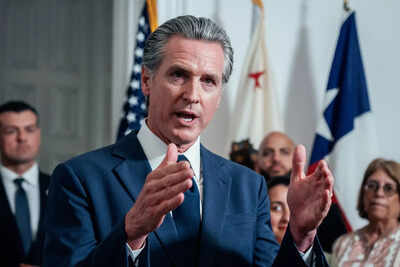ARTICLE AD BOX

(Andri Tambunan/The New York Times)
California Governor Gavin Newsom has never been known to temper his words, but his latest salvo against America’s most prestigious universities, Harvard, Columbia, Brown, and the University of Pennsylvania, has triggered a fierce debate over whether the Ivy League and its peers are quietly sacrificing principle for survival.In an era when federal funding is both lifeblood and leverage, Newsom’s charge of universities “selling their souls” to the Trump administration slices directly into the uneasy nexus of money, politics, and academic independence.
The spark: Settlements and sanctions
The controversy began when reports surfaced that several elite institutions had agreed to multimillion-dollar settlements with the Trump administration to restore frozen federal research grants.
The freeze came after the administration accused universities of either failing to adequately address antisemitism on campus or promoting “woke” initiatives in violation of federal standards.Newsom, speaking on Pod Save America, did not mince words. “UCLA is not going to sell their soul like Harvard or Brown or Penn or Columbia. Shame on all of them. We’re not. And we’re going to fight like hell to protect our democracy, our liberties, our freedoms.
I love Republicans. I love Democrats. I don’t care what your party affiliation is. I honestly don’t. I care about this country and our democracy. I care about the rule of law.
”While elite universities insist that settlements are pragmatic measures to end costly investigations and secure continued access to billions in federal research dollars, critics see something more corrosive: an erosion of moral authority.
A $500 million price tag
Harvard’s case epitomizes the crisis. Reports indicate that the university is weighing a $500 million settlement to regain access to more than $2.6 billion in federal funding. For Newsom, the compromise cuts to the institution’s very identity. “And let me make this crystal clear to everyone watching and make it crystal clear to the folks at Harvard,” he said. “We will never ever sell our soul to Donald Trump. Harvard, I pray you are listening.
How could you? Of all institutions, on tens of billions of dollars, what’s the point of your damn endowment if you cannot stand on principle?”The rhetorical sting lies in his point: Harvard’s endowment exceeds $50 billion, larger than the GDP of some nations. Why, Newsom asks, would a university of such financial heft bow to federal pressure instead of enduring the funding drought?
UCLA: The lone holdout
Newsom has positioned the University of California, Los Angeles (UCLA) as the counterexample.
The Trump administration is reportedly demanding a $1 billion settlement from UCLA, alongside the creation of a $172 million claims fund for alleged Title VII violations under the Civil Rights Act.The governor has vowed that under his leadership, UCLA will not capitulate. Speaking in San Francisco earlier this month, he thundered: “We’re not Brown, we’re not Columbia, and I’m not going to be governor if we act like that.
Period. Full stop, I will fight like hell to make sure that doesn’t happen.”The standoff sets up UCLA as a potential battleground, where principle and politics collide with the raw financial calculus of survival.
Why did they “lose their souls”?
The phrase “selling their souls” is not a rhetorical flourish alone; it points to a broader structural fragility. American universities, even those with massive endowments, rely heavily on federal research grants to sustain laboratories, pay faculty, and remain globally competitive.
According to the National Science Foundation, federal agencies supplied more than 50 percent of academic R&D funding nationwide last year.When that spigot is shut off, even elite schools feel the sting. Faculty departures, stalled projects, and reputational damage loom large. Settlements, then, become not just about compliance but about institutional survival.Yet critics argue that in agreeing to Trump’s terms, whether over antisemitism protocols or restrictions on diversity initiatives, universities are legitimizing a political litmus test for research funding, undermining their own claim to independence.
The broader implications
The question that lingers is not just whether Columbia or Brown compromised, but whether higher education itself is at risk of becoming hostage to political power. If federal funds become contingent on aligning with the ideological preferences of the ruling administration, can universities still claim to be bastions of free inquiry?For Newsom, the answer is clear. His defiance positions California as the holdout state, one prepared to endure financial strain rather than concede ground.
But for institutions already under investigation and staring down billions in frozen grants, the path of resistance appears less straightforward.
Principles vs. pragmatism
Newsom’s rhetoric frames the moment as a moral test: Stand firm for democracy or bend under financial duress. Universities counter that without research dollars, their ability to innovate, cure diseases, and lead globally would collapse.But the charge of “selling their souls” is likely to linger, not just as political theatre but as an indictment of how American higher education navigates an era of intensifying political intervention. Whether elite institutions can reconcile financial pragmatism with academic principle may ultimately decide whether they are remembered as defenders of independence or as cautionary tales of capitulation.



.png)
.png)
.png)
















 1 hour ago
3
1 hour ago
3









 English (US) ·
English (US) ·